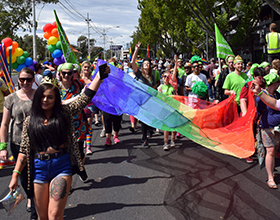
Young people identifying as LGBTQI are at increased risk of mental health problems for a number of reasons including bullying, stigma and lack of support services.
On the day of Sydney Mardi Gras we are sharing a chat between Yasmine and Michelle, two young people involved in the work of Orygen, on why it is more important than ever to support LGBTQI young people and their mental health and wellbeing.
Persons who identify as LGBTQI are almost twice as likely to experience mental ill-health than their peers, what factors do you believe contribute to this?
I believe that exclusion and discrimination are contributing factors. Exclusion can include a variety of instances including family rejection, lack or loss of friendships or feeling invisible to healthcare providers because of gender/sexual identity. Discrimination refers to any act that negatively impacts a person on the basis of their sexuality or gender identity. In addition to discrimination from peers or other social connections, LGBTQI youth are actually taking this discrimination and internalising it, ultimately affecting their own self-concept. Before a young person even realises they are questioning their sexuality or gender identity, they distinguish it as taboo or abnormal in comparison to their peers. This shattered self-esteem is a possible cause for an increase in mental ill-health.
Although many people may believe there is more acceptance today for people who identify as LGBTQI, why should we continue to focus on this population group?
Gender, sexuality and societal norms are still consistently being forced upon LGBTQI youth, whether it be directly or indirectly. People who identify as LGBTQI may fear being completely authentic or worry about social situations that may result in having to ‘out’ themselves, opening themselves up for rejection or judgement. There may be a general consensus among our society that there is more tolerance to LGBTQI issues, but this is tolerance, not encouragement. It’s almost like the statement ‘it’s fine if you’re like this, but I would prefer it if you weren’t’. Unfortunately LGBTQI youth remain a group at risk and are asking for more support, especially in terms of mental health.
What do you think are some of issues that still need to be addressed when developing supports for this group of young people?
In terms of the community, greater protection and more education could enhance self-esteem and feelings of acceptance for LGBTQI youth. For instance, teaching about sexual orientation, gender identity and same-sex sexual education could provide young people with a sense of inclusiveness. As well as this, a non-judgmental or non-assuming attitude should be used when talking about young people and their sexuality.
Do you have any advice for a young person who may be questioning their sexuality or gender identity?
Don’t rush yourself. It can take a lot of time to get to the point when you feel you can identify with a specific label. Better yet, you don’t need a label at all if you feel that you don’t want one. Sexuality is hard to define and can also be relatively fluid so whatever you decide fits you best, it doesn’t always have to be concrete. I think that if you’re questioning your sexuality or gender identity, you need to look after yourself first and foremost. Reach out if you need more help, be patient with yourself and remember that although there are some people who aren’t going to understand what you are going through, there are always people out there who love and accept every part of you.
Do you have any advice for a young person experiencing homophobia?
Try to reach out for help and tell someone what is happening to you. You do not deserve to be made to feel less significant based on your sexual orientation or gender identity. There are people who want to support you and stop LGBTQI-related bullying. Remember that although some people may judge you for who you are, you do not need to change yourself based on other people’s beliefs and opinions.
If there were a message you could give to people who engage in homophobic or discriminatory behaviour, what would it be?
It is important to understand that outcomes of homophobic behaviour are damaging and potentially fatal. If you are someone who bullies or is violent towards others based on their sexual preference or gender identity, I would advise you to remove yourself from those people. You are not expected to like or accept everyone, but it is not acceptable to bully others on the basis of them not conforming to your ideas of what is normal. Just because you do not agree with something, doesn’t mean that others need to change to accommodate your beliefs.